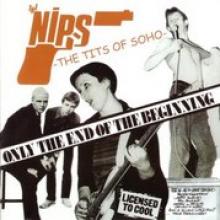If you can hunt down Punk Rock Movie, MacGowan’s apparently the guy wearing the Union Jack coat pogoing around some dingy club. Apart from being just on the scene, MacGowan formed a group in ’77, The Nips, which functioned for the next three or four years without releasing a proper full length – just a clutch of singles. Luckily, The Tits Of Soho was compiled and released a few years back and collects pretty much everything (?) that the band recorded. Spread out over these singles, though, are a series of slight stylistic shifts only perceptible to geeks, dweebs and dudes with spiky hair.
The difference between the band’s first single – “King of the Bop” b/w “Nervous Wreck” – and some of that latter fair is noticeable, though, and more over, acceptable. Musically, the a-side comes correct, even if it’s a bit off putting to hear MacGowan sing the title of the track. Even with that, the singer’s attempt at unique crooning on the following track doesn’t work as well in some places. An auspicious beginning for sure and as the The Tits Of Soho soldiers on the influence of mod stuffs and pop becomes more and more clear.
At some point, the band was even able to convince Paul Weller to work with the band on a few tracks. “Happy Song,” produced by the Jam front man, begins with a ska related guitar part prior to kicking into some territory befitting the song’s producer. Lyrically it’s all pretty trite, but the music easily excuses that. The guitar solo seems out of place – and insanely shambolic, more befitting Pere Ubu or someone of that ilk. Forgetting about that, MacGowan seems up to the task of leading the band through whatever it might encounter even during his early twenties.
The first half of this disc is given over to that collection of studio work with the remainder being comprised of the same tracks in a live setting. The recordings are better than one might guess, but the levels are a bit messed up. Even with that, the Nips performing live are able to rev up some of the tracks that didn’t quite have ‘IT’ in the studio. And while the guitar towards the end of the disc lacks the aggression of the band’s punk cohort of the time, it’s a rather small criticism to levy on a group that should have been better received regardless of who was singing.
